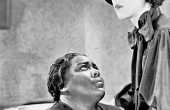Montayj79
Contributing writer for The Artifice.
Junior Contributor II
- Lurker
- Sharp-Eyed Citizen
- ?
- Articles
1 - Featured
1 - Comments
13
- Ext. Comments
6 - Processed
6 - Revisions
2
- Topics
3 - Topics Taken
1 - Notes
20
- Topics Proc.
7 - Topics Rev.
5
- Points
295 - Rank
X - Score
167
Latest Articles
Latest Topics
The War on Poverty Through Black SitcomsArguably, the war on poverty in America (President Lyndon B. Johnson), though one of its goals was to break the cycle of dependency, in fact did the opposite by creating incentives and decentives that penalized work (raises led to loss of benefits) and rewarding nonmarriage. Hollywood tends to take it a step forward, by focusing both on the war on poverty the religious exploitation of blacks during The Peculiar Institution. As a result, popular black sitcoms, such as Good Times and What's Happening! specifically from the 70s (a key era in black empowerment) focused on the idea of being good (morality v immorailty). By appealing to the message in The Willie Lynch Letter of focusing on the woman and using her as a buffer, these shows keep the main black family from taken advantage of opportunities because they may be somewhat "immoral." (see episode 4, season 1 of Good Times for an example). What is your take on this idea?
|
Film, Law, and False DepictionsThe 2008 film, American Violet highlights some wicked practices of the criminal justice system when it comes to plea bargaining. Using this film as well as the real story that took place in Hearne, TX (as opposed to Melody, TX as portrayed in the film), what racial and social realities do we find in such movies? Why do films portray false evidence in instances where they do not necessarily have to? (For example, the film depicts only 2 ACLU lawyers rather than even remotely mention that it was a team working on the case). Finally, does the film provide an accurate depiction of America’s plea bargaining system or is it an exaggeration?
|
Othello (The Killer) versus Big Screen KillersHow can a character, such as Shakespeare's' Othello, be compared to characters in film. For instance, what similarities (physical, psychological, etc) does Othello have to characters that kill on film, such as the characters from the 1995 film, The Usual Suspects. The focus here should be on what drives these people to kill. Explore economics, manipulation, and corruption. Obviously, these two works have easily identifiable differences, but the objective is to dig into the psychological to show how their different circumstances leads them down the same road. In other words, think of Othello as a character in The Usual Suspects (or vice versa, one of the characters from The Usual Suspects in Othello's place).
|
Latest Comments
| Misogynoir: The Silent Backbone of Hollywood | |
Thank you and you’re welcome. | Misogynoir: The Silent Backbone of Hollywood |
Definitely!!!!!!!!! | Misogynoir: The Silent Backbone of Hollywood |
No need to apologize. Your comment wasn’t offensive and if mine sounded harsh, it wasn’t. I only wanted to respond to your points and clarify my position. | Misogynoir: The Silent Backbone of Hollywood |
Thank you for sharing. It is very tiresome to watch movies with the same stereotypes being portrayed year after year. | Misogynoir: The Silent Backbone of Hollywood |
Nice try at sarcasm but it failed. You can’t explain in your wildest dream how you draw the connection besides bigotry. And btw, it’s Hip Hop with two capital h’s. | Misogynoir: The Silent Backbone of Hollywood |
I believe Blade has enough familiarity in part one. Part Two or Three would not exist if there is no familiarity in Blade (One). The point being made is how he only has a love interest or true emotions when presented with a nonblack ‘partner,’ which I highlight. Misogynoir is a dislike for black women. Thus, it would be inadequate to write about males or queers. The question I was presented specifically defined gender roles. While I am always open to criticism, I do think much of your response would be for a different topic/question. | Misogynoir: The Silent Backbone of Hollywood |
I remember in high school they had us read this and I’m not sure if I liked it then and not sure if I would revisit it now. | Of Mice and Men: How does Steinbeck Portray Oppression? |

Touche